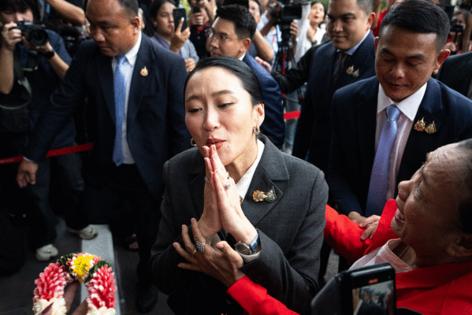Persecuted Thai pro-democracy party now poised to play kingmaker
Published in News & Features
A Thai pro-democracy party whose rise to power has been thwarted by the country’s conservative establishment is suddenly in pole position to anoint its next prime minister.
After the Constitutional Court ousted Prime Minister Paetongtarn Shinawatra on Friday for an ethics violation, her unwieldy 10-party coalition split up. Now the People’s Party, which has been in opposition since a 2023 election despite winning the most seats, is being courted by rival political groups seeking to form a government.
The two main possibilities to become prime minister are Anutin Charnvirakul, the conservative leader of Bhumjaithai who is widely considered the frontrunner, and Chaikasem Nitisiri, the only remaining candidate backed by the billionaire Thaksin Shinawatra, the father of Paetongtarn who had been the country’s most popular politician over the past few decades.
The People’s Party has set several conditions to secure its backing, including dissolving the lower house within four months to call a snap election and holding a referendum on a new constitution. Its leaders will hold a meeting Monday afternoon to formalize their strategy.
The emergence of the People’s Party as kingmaker poses a fresh test for the country’s royalist establishment. Even if any new government is effectively a caretaker administration, a strong showing for the pro-democracy party in the next election would again put it at risk of being disbanded for advocating measures that would curtail the monarchy’s powers, similar to its two predecessors.
“The constitution is crooked, designed to keep parties and politicians weak and to give the power to the judicial system,” said Thitinan Pongsudhirak, a professor of political science at Chulalongkorn University. “The rules are rigged. Rigged rules lead to a big mess.”
Yielding to People’s Party’s conditions also means the next prime minister risks heading a minority government that will only be in power for a few months. That could spell more political turmoil, with analysts warning of policy paralysis and fiscal profligacy in the run-up to elections.
Thai stocks are down almost 12% this year, the worst performer in Asia, while its currency has strengthened more than 5% amid sustained dollar weakness.
Moody’s Ratings said in a recent analysis that Thailand’s polarized politics — characterized by frequent government changes and fragile coalitions — has held back investment and stalled reforms needed to fix structural issues.
“We expect the political uncertainty in Thailand to persist over the medium term, which will continue to drag on the country’s growth potential and add to its vulnerability to shocks,” Moody’s said in a report.
Within hours of the Constitutional Court decision on Friday that removed Paetongtarn, Anutin was at the People’s Party office to lobby for support, a surprise for Thai watchers given the conservative bona fides of his Bhumjaithai Party. After the meeting, the businessman-turned-politician said he was ready to accept the People’s Party’s conditions.
But on Saturday, People’s Party leader Natthaphong Ruengpanyawut said his group had yet to commit. The party, backed by largely young and urban voters frustrated with the stranglehold of the old guard in Thai politics, is prepared to consider all proposals subject to its conditions being met, he said.
On Sunday, the party held talks with Thaksin’s Pheu Thai Party, a day after the billionaire telegraphed his openness to its reform agenda by meeting with Thanathorn Juangroongruangkit, the founder of the Future Forward Party, the original incarnation of the progressive political group.
Political Realignment
Thailand has a long history of political instability marked by royalist judges and generals booting out elected prime ministers. Paetongtarn became the fifth premier associated with her father’s Shinawatra clan to be dismissed by the Constitutional Court. Thaksin’s Pheu Thai party now only has one possible candidate left after seeing two prime ministers booted out in roughly a year’s time.
Anutin has secured the support of 279 lawmakers, more than the 247 votes required to clinch the job, Thai media outlet The Nation reported Saturday. That number includes 143 lawmakers from the progressive People’s Party, along with pro-royalist and establishment parties that had previously opposed it.
If Anutin wins the progressive party’s support, it would mark yet another realignment of political forces in Thailand. His Bhumjaithai Party was among the first to oppose a bid to form a government by Move Forward, which won the most seats in the last election before the Constitutional Court disbanded it last year, prompting its lawmakers to form the People’s Party.
People’s Party has maintained a wide margin over its rivals in recent opinion polls, with its leader Natthaphong ranked the most preferred premier candidate. However, current rules bar any of its candidates from holding the top spot until after the next election.
People’s Party defended its decision to offer conditional support for either conservative candidate, saying in an X post that it was “focused on moving the country towards a new election as soon as possible to bring about change in line with the ideology that the party adheres.”
While there’s always a risk of People’s Party being shortchanged in a deal with any alliance, it also could emerge stronger after the next election, according to Stithorn Thananithichot, a political science lecturer at Chulalongkorn University in Bangkok.
“If they don’t join the game at all, they’ll be completely off the board,” Stithorn said. “At the very least, they need to show their stance that they tried their best to push for constitutional amendment. Because no matter when the election is held, that’s still a key agenda for People’s Party.”
©2025 Bloomberg L.P. Visit bloomberg.com. Distributed by Tribune Content Agency, LLC.







Comments